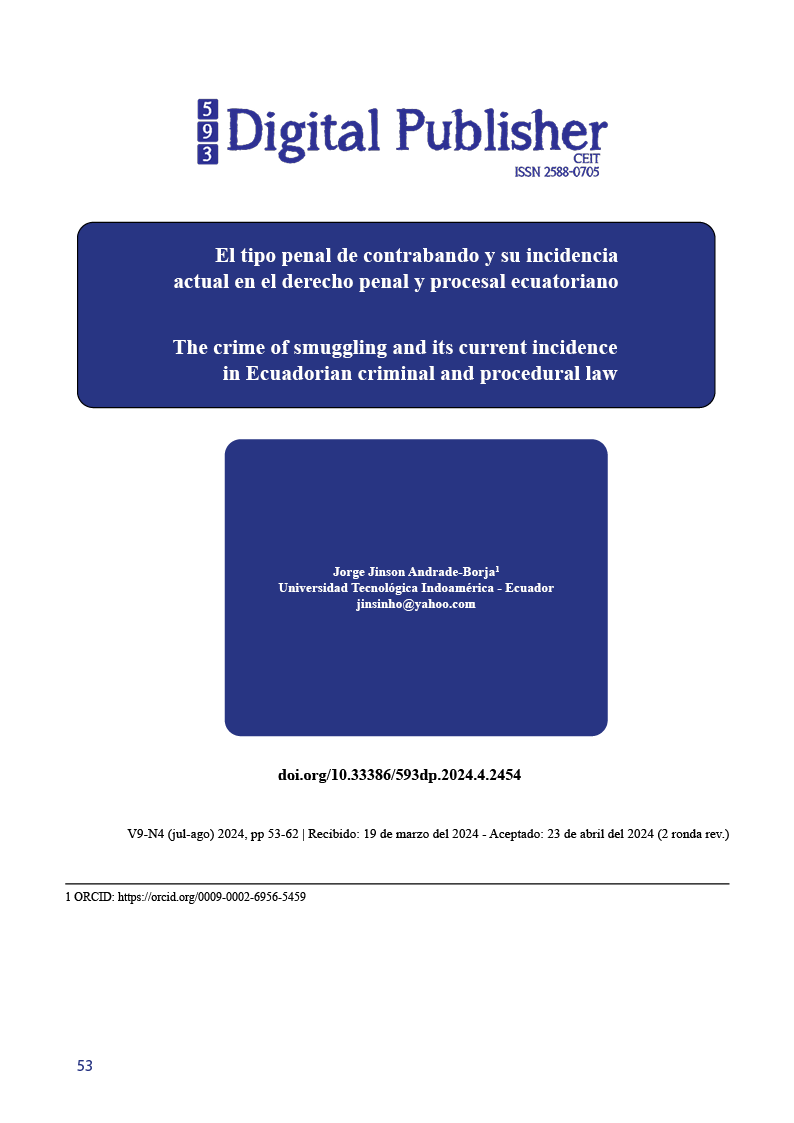The crime of smuggling and its current incidence in Ecuadorian criminal and procedural law
Main Article Content
Abstract
The Comprehensive Organic Penal Code, in its article 301, describes the conduct for which it penalizes the crime of smuggling. The crime of smuggling punishes the act of entering merchandise that does not have the respective property endorsements that legitimize its legality. Due to the wording of the criminal offense, it has several new circumstances, for example, the obligation to present documents that legitimize ownership, border areas, the time to begin criminal action, etc. Whose protected legal asset lies in the state economy. As the criminal type is configured, it does not violate the presumption of innocence in the section of justifying the legality of the merchandise, since said burden of proof will always be in the hands of the Prosecutor's Office; However, the criminal type has a procedural budget in the understanding of waiting 72 hours to start the criminal process, which allows the non-existence of a criminal process with flagrancy modality.
Downloads
Article Details

This work is licensed under a Creative Commons Attribution-NonCommercial-ShareAlike 4.0 International License.
1. Derechos de autor
Las obras que se publican en 593 Digital Publisher CEIT están sujetas a los siguientes términos:
1.1. 593 Digital Publisher CEIT, conserva los derechos patrimoniales (copyright) de las obras publicadas, favorece y permite la reutilización de las mismas bajo la licencia Licencia Creative Commons 4.0 de Reconocimiento-NoComercial-CompartirIgual 4.0, por lo cual se pueden copiar, usar, difundir, transmitir y exponer públicamente, siempre que:
1.1.a. Se cite la autoría y fuente original de su publicación (revista, editorial, URL).
1.1.b. No se usen para fines comerciales u onerosos.
1.1.c. Se mencione la existencia y especificaciones de esta licencia de uso.
References
Alpaca Perez, A. (2015). Delitos tributarios y aduaneros. Ubi Lex, Lima.
Arias, Bramont. (2003). La nueva tipificación de los delitos aduaneros. Buenos Aires, Argentina: De palma.
Ávila, Diego. (2020) Acusación particular o denuncia maliciosa, ¿un tipo penal adecuado?. Editorial Legis. 2020,
Carrara, Francesco & Soler, S. (1948). Programa de Derecho Criminal. (Vol. VII). Buenos Aires: De palma.
Donna, Edgardo. (2008). Derecho Penal . (Segunda ed., Vol. IV). Buenos Aires, Argentina : Rubinzal-culzoni
Flores, Edgar. (2016). Estudios de derecho penal y Criminología. (Primera ed. p95). Quito, Ecuador: Jefatura de Biblioteca Gaceta y museo de la CNJ.
Muñoz, Francisco. (2017). Derecho Penal . (XXI ed., Vol. Parte especial ). Valencia, España: Tirant lo Blanch.
Ramírez, Andrés. (2017). Tesis de maestría en derecho penal. La aplicación de los principios de legalidad y lesividad en los delitos de sabotaje y terrorismo en un estado constitucional de derechos y justicia: análisis de casos. Universidad Andina Simón Bolívar, sede Ecuador, pág. 47.
Rosal, Juan. (2018). Tratado de derecho penal español.
Tavares, Juárez. (2004). Bien jurídico y función en derecho penal. Traducción de Mónica Cuñarro. Buenos Aires: Hammurabi.
Vascones, Vicente. (2020). El dolo: indicadores objetivos de responsabilidad en el proceso penal, UIRIS DICTO, Quito.
Zavala, Jorge. (1997) Delitos contra las personas. El homicidio simple. Edino. Guayaquil.
Normativa
Constitución de la República del Ecuador [CRE]. 20 de octubre de 2008.
Código Orgánico Integral Penal [COIP]. 10 de febrero de 2014.
Código Orgánico de la Producción, Comercio e Inversiones [COPCI]. 29 de diciembre de 2010.
Resoluciones
Corte Constitucional del Ecuador. (2020). Sentencia no. 14-19-CN/20
Corte Nacional de Justicia (2021). Sentencia no. 0025-2021, causa Nro. 09281-2018-06032


